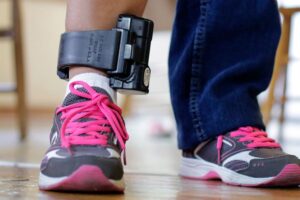When something RIGHT goes WRONG (part 2)

When something is not working, we want to fix it. When something causes harm, we want to stop it. The impulse to make it better is a good one. But sometimes, reforms backfire. Sometimes what we try to fix gets worse in the fixing.
Consider the innovative (and humane) method used to help reduce mass incarceration: electronic monitoring. This is the ankle monitor that tracks (by radio signal or GPS) the whereabouts of its wearer. What a good idea! Instead of putting someone in jail as they await trial, why not control their movements (and insure they will come to court) by attaching an ankle monitor? Instead of caging them for a nonviolent offense, what about an ankle monitor to severely restrict movement up to and including house arrest?
But, here’s the rub (pun sort of intended…yes, jailhouse humor): Localities that use electronic monitoring often contract with for-profit firms for the service. Rather than charge the governments, these companies generally charge the people being supervised. A national survey by NPR found that 49 states — every state except Hawaii, plus the District of Columbia — now allow or require the cost to be passed along to the person ordered to wear one.
A ProPublica story entitled “How Electronic Monitoring Devices Drive Defendants into Debt,” includes the experience of a 19-year-old St. Louis man arrested (his first offense) for driving a stolen car. His public defender managed to get his $1500 bail reduced to $500 (which was covered by the non-profit Bail Project) with the condition that he wear an ankle monitor. For as long as he would wear it, he would be required to pay $10 a day to a private company. Just to get the monitor attached, he would have to pay $300 up front — enough to cover the first 25 days, plus a $50 installation fee. (Fees can range from $150 per month to as high as $1,200. And this does not include the startup fee, which can be up to $200.
In another story, “Ankle Monitoring Practices Are Akin to Extortion,” a 49-year-old longshoreman arrested for a DUI chose 58 days on an ankle monitor rather than a 120-day jail sentence because he was the full-time caretaker for his paralyzed mother. He paid an enrollment fee of $200 plus $13 a day, which totaled more than $1600 for the length of his sentence. He began selling his personal possessions to keep up with the payments.
Others reportedly sell blood plasma to make their payments.






2 comments
How utterly shameful. Really, corporate profits and public service should never be smooshed together in criminal justice, or medicine, or education as far as I am concerned. These populations should not be victimized and preyed upon as they are not free to make any choices but the ones being offered.
It’s astonishing how many parts of the public criminal justice/ incarceration system are privatized and for-profit.
Leave a Comment